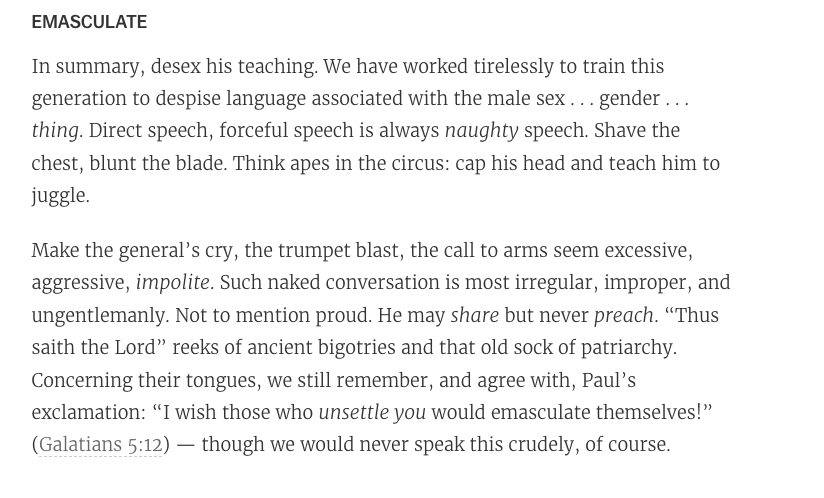Three Questions to Ask Yourself Before You Try to Imitate The Screwtape Letters
In praise of Screwtape's letters, and in challenge to lesser demonic epistles

My dear readers,
It has come to my attention that the early-to-midcareer demons who tempt on the likes of us bloggers (and anyone else who is terminally online) have persuaded some of us that writing in the style of C. S. Lewis’s 1942 novel The Screwtape Letters is a good way to make a theological point to your audience.
I fear that this style of writing is not only contrived but displays a meager understanding of what, exactly, makes The Screwtape Letters a popular novel to this day. The Screwtape Letters is not standard theological blogfare, except in epistolary form and backwards. There is a style and intention to this novel which many of its imitators seem to miss.
Usually a Christian author writing a Screwtape Letter of his own will produce content that looks like this: the writer states the opposite of what he means to say, then adds the characteristic “my dear X” salutation at the beginning and “your affectionate Y” at the end. At its most unintentionally comic, X and Y are demon names created in the Lewis style, which combines gross words and weird sounds at the author’s discretion. Sometimes there is an effort to mimic Screwtape’s silky, contemptuous tone, but the effort is a poor one.
An example:
My dear Qrcbrcschrk,
How droll it will be when we have made abortion acceptable to everyone, and women abandon their children to daycares and seek jobs as office managers.
Your affectionate uncle, Pissshingles
This is an exaggeration, but only in style, not in form or content.
The article produced in this style primarily suffers because the author’s thoughts are not insightful. However, the not-insightful article plus the Screwtape conceit is worse than the article would have been without it, for two reasons:
First, the author has invited the reader to compare himself as a lay theologian with C. S. Lewis, also in his capacity as a lay theologian. This is like setting out to write a collection of odes, but deciding ahead of time that the subject of every ode will be Grecian urns. You are not going to win over your audience, because you have already selected your competition. There is no possibility of winning this field.
Second, the author has gone and added the grotesquely hubristic step of implying that if you don’t agree with the author, you are like a demon and have a demon’s thoughts. This combination of confidence and incompetence is rarely a promising one.
The Screwtape Letters is insightful, incisive, surprising, and above all, funny. This is a tone that is incredibly difficult for the average author to meet. It is, to be fair to its imitators, not flawless. However, it is harder to succeed in writing a Screwtaper letter than it looks.
And so I would invite you writers who are interested in imitating it: what should you ask yourself before you attempt to write in the style of The Screwtape Letters? What does the demon voice accomplish for you?
Q1: Do you know what The Screwtape Letters is about?
The Screwtape Letters is, according to the frame narrative introduced in the preface, a series of 31 out-of-order letters from demon Senior Tempter Screwtape (Abysmal Subliminity Under Secretary Screwtape, TE, BS, etc.) to his nephew and mentee, Wormwood. Wormwood is a recent graduate of the Tempters’ Training College for Young Devils, and has been assigned to tempt “the Patient,” a young Christian man living in London during the Blitz. Wormwood’s letters are not included in the text; we only see short selections in Screwtape’s letters when Screwtape quotes his nephew. In the preface of the novel (in which Lewis insists that he did not write these letters, rather found them), Lewis warns us that Screwtape is not a reliable narrator, even from his own demonic perspective. Screwtape is vulnerable to many misconceptions. He generally thinks people are worse than they are, he does not keep track of human time, and he is largely unable to understand or even perceive decency or virtue.
Both Screwtape and Wormwood are mid-tier devils. There is nothing important about this man whom Wormwood has been assigned to tempt. In fact, this seems to be Wormwood’s first or second job. Screwtape himself is a Senior Tempter, but his relative powerlessness combined with his obsessive social climbing are frequent themes in the text. Screwtape hates his colleagues (they’re demons, after all), but he’s also constantly aware of the need to flatter them.
For instance, in Letter 19 Screwtape is extremely concerned that other demons might be reading Wormwood’s mail:
By the way I hope you understand, too, that some apparently uncomplimentary references to Slubgob were purely jocular. I really have the highest respect for him… But do keep everything (Screwtape’s letters) under lock and key.
Later in Letter 22, Screwtape and Wormwood’s relationship further deteriorates when Wormwood attempts to report his uncle to the secret police. Screwtape, in return, threatens him with torture. Both of their positions are incredibly insecure, and they are constantly on guard with, and at war with, each other and other demons.
Because Lewis commits to the conceit that Screwtape is a demon in middle management, Screwtape’s observations are limited to the field where he is an expert – namely, human interactions. Lewis never bores us with eighth-grade insights like “war is bad” or “church attendance is good” because Screwtape does not operate on that level. The great evils of the world, like warfare and poverty, are significantly above his rank.
More to the point, Lewis writes Screwtape as a plausible and coherent demon character. Screwtape has a demon’s insight into the world, which he got from his (frequently floundering, incompetent) demon teachers and his own on-the-job experience. This means that Screwtape emerges as both a great anthropologist and a terrible theologian. He is unable to put himself on “the Enemy’s side” and determine what humans ought to be doing. Screwtape has no concept of “orthodoxy” or “orthopraxy” to reject or teach against. He does not start from his exhaustive understanding of theological ethics and then simply try to produce the opposite. He’s a demon, and as such, Screwtape does not understand what God wants.
Screwtape’s insights into human behavior are pretty good – though not, as he laments in Letter 1, as good as “The Enemy’s,” who’s actually been a human. Nonetheless, Screwtape is perpetually frustrated by his inability to understand God. For example, in Letter 19, Screwtape reverses a claim he made in an earlier letter and denies that God loves humans. There must, he believes, be some other reason why God made them.
He must have some real motive for creating them and taking so much trouble about them… When the first creation of man was first mooted and when, even that that stage, the Enemy (God) freely confessed that he foresaw a certain episode about a cross, Our Father (Satan) very naturally sought an interview and asked for an explanation. The enemy gave no reply except to produce the cock-and-bull story about disinterested love which He has been circulating ever since… if we could only find out what He is really up to!
Likewise, in Letter 16 Screwtape notes distinctions between low churches and high churches, but not to favor one over the other for his ends. Screwtape is more interested in getting members of different churches to hate each other. There is no thoroughgoing sense that Screwtape knows what God wants Christians to do and then tries to produce the opposite. Screwtape never tries to get Catholics to be Protestant or Protestants to become Catholic. He is observing humans for signs of hatred and discord between each other and towards God, and tries to produce that. This isn’t particularly surprising, given that Lewis grew up in Belfast (a city with frequent incidents of intra-Christian violence) and that Lews was influenced by an ecumenical array of Christian writers, including Catholics G. K. Chesterton and J. R. R. Tolkien as well as Protestant universalist George MacDonald.
This is why Greg Morse’s Globdrob letters are particularly stupid. Globdrop, Morse’s Screwtape analogue, actually does have really strong opinions about the finer points of Christian practice:
Globdrop is able to articulate what a demonic marriage looks like from his perspective, but can’t really say why it’s bad. He knows it’s bad though, because Greg Morse knows it’s bad, and knows why it’s bad. It’s not correct. The fact that this marriage can bring about love for God and love for neighbor isn’t relevant information. Greg Morse doesn’t care about love for God or neighbor. Greg cares about who is right and who is wrong. Greg is right. People who aren’t like Greg are wrong. Demons want people to be less like Greg and more like other people. And so, this is what Globtrob cares about.
This is similar to the newly-theologically-engaged Screwtape in Walter Martin’s Screwtape Writes Again, in which Screwtape (still writing to Wormwood despite the events of the last novel) suddenly develops really strong opinions about theology after all, and what people should be reading.
Screwtape has gone from disliking a vulnerable, authentic, self-examining, ecumenical form of Christianity to throwing in his whole lot with any expression of Christianity that isn’t American evangelicalism. There’s nothing incisive or interesting happening here. There’s certainly nothing that requires a keen eye for human behavior. There’s just the author’s thoughts about how right he is, which his chosen demon strenuously opposes.
Q2: Do you get why The Screwtape Letters is funny?
C.S. Lewis hated writing The Screwtape Letters. “I never wrote with less enjoyment,” he writes in the preface to the considerably weaker “Screwtape Proposes a Toast.” “The world into which I had to project myself while I spoke through Scretape was all dust, grit, thirst, and itch.”
This has, honestly, always surprised me a little bit. Lewis’s description of Screwtape’s world is accurate, but the book is funny to a point that it is sometimes difficult to believe that this writing is not pleasant in some capacity. Not because it seems pleasant in itself to write demonic correspondence, but because this demonic correspondence seems pleasant to write. Screwtape is a consistently funny character, in his self importance and his continuous failure. He is contemptuous and ridiculous. He is megalomaniacal and constantly confused. He has a hawk’s eye for human failing and exactly what makes us humans ridiculous and miserable. Nonetheless, he is completely undone by the basic problem that God wants humans to experience joy, and Screwtape can’t compete with that.
How do you really not enjoy writing such a nasty but floundering demon character? And if you don’t like it, how did he turn out so funny? But at any rate, Lewis didn’t like it. Nonetheless, The Screwtape Letters is hilarious. And this is a key aspect of its insight.
Why do I think this book is so funny? Here’s some lines that I think can help us get to the point.
Here’s Screwtape on sexual temptation:
Even under Slubgob you must have learned at college the routine technique of sexual temptation, and since, for us spirits, this whole subject is one of considerable tedium (though necessary as part of our training) I will pass it over.
Here’s Screwtape’s preferred play for using sex to create havoc among sensitive men.
If… he is an emotional, gullible man, feed him on minor poets and fifth-rate novelists of the old school until you have made him believe that “Love” is both irresistible and somehow intrinsically meritorious. This belief is not much help, I grant you, in producing casual unchastity; but it is an incomparable recipe for prolonged, ‘noble,’ romantic, tragic adulteries, ending, if all goes well, in murders and suicides.
Here’s Screwtape on what he likes about a pacifist couple:
...not on moral ground but from an ingrained habit of belittling anything that concerns the great mass of their fellow men,, and from a dash of purely fashionable and literary communism. That is excellent.
Here’s Screwtape on what to do with a spiritual awakening:
Let the little brute wallow in it. Let him, if he has any bent that way, write a book about it; that is often an excellent way of sterilizing the seeds which the Enemy plants in a human soul.
I think all the above quotes are really funny. There’s a lot to recommend as far as humor goes: litotes and other understatements, building to a punchline (“ending, if all goes well, in murders and suicides” is excellent), tone, prevalent petty nastiness. But primarily, Screwtape has two things going for him in the humor department. The first is that he is, as we have discussed above, a mid-career bureaucrat and thus a fairly pathetic figure. This makes Screwtape an excellent example of Todd McGowan’s theory of comedy: namely, that comedy occurs at an intersection of excess and lack. “Lack” here refers to the daily, the routine, the quotidian, the boring, and the limited. “Excess” refers to wildness, surprise, out-of-placeness.
Screwtape is a demon and his job is to bring souls into Hell for Satan (excess). His life is also one of imaginable tedium (lack). Screwtape works the world’s worst office. His career is not going the direction he wants it to. The devil he is coaching is apparently terrible at his job. Most of Screwtape’s life is boring, frustrating, competitive in a grinding, unproductive way, and fixated on tiny details.
This is a hilarious way to write about a demon. Senior Tempter of hell (excess), terrible bureaucratic office job (lack). However, the misery and pettiness of Screwtape’s day-to-day work is, in addition to being funny, also critical in expressing the book’s major themes.
Screwtape doesn’t fight the culture wars. He doesn’t fight any wars. Screwtape cannot cause wars to break out or end. He can’t set major cultural trends or end them. He can’t cause laws to be passed or not. Screwtape is too menial of a demon to create the news. All he can do is cause individual reactions to it. And so this is where his attention remains: on the menial.
Screwtape is never obsessed with the things that obsess us. Most of life is, as he describes it in letter 19, “raw material.” Marriage, singleness, sex, celibacy, illness, health, success, failure – all this is, for Screwtape, more or less the same.In his own day, Screwtape is not important enough to create or propagate Nazism, fascism, or xenophobia. In our day, even if we were committed to the idea that feminism, socialism, and abuse advocacy were demonic (and they are not), Screwtape wouldn’t be involved in making these ideas popular. That is not his job. He is not nearly important enough to work on broad, social-level change. If Screwtape does work on that, we lose what makes him funny.
More to the point, Screwtape’s pettiness is actually crucial for expressing one of the major motifs of the book: namely, that more pleasures, ideas, experiences, and beliefs are able to be experienced as goods than humans usually suspect. Screwtape is always on his back foot, because he is operating in God’s creation. Screwtape has to take ideas and experiences and make them useful for his own ends. Very little of reality is inherently useful to him, because he is not the one who made it.
For instance, take Screwtape’s hand-waving at the pacifist couple, discussed above. Screwtape doesn’t particularly care that they are pacifist. He cares how and why they are pacifist – they are academics, they live in wartime and are reflexively resistant to the common experience of people around them (that is, supporting the war effort), and they indulge in a naive socialism that they seem to have conflated incorrectly with the National Socialist State. Screwtape doesn’t actually care if people are socialists, pacifists, or whatever else. What he cares about is why. Does a virtue or a vice lie behind this person’s behavior? If it’s a vice, Screwtape is happy. If it’s a virtue, Screwtape goes to work on it.
In fact, Screwtape rarely cares what anyone thinks about anything. Screwtape hardly ever says that this or that belief, state, idea, or habit is good or bad. What makes it useful for him is entirely why and how a patient has this belief, not what the belief itself is. This has the effect of making The Screwtape Letters at times a surprisingly relativist text. Lewis seems consistently uninterested in determining whether it is good or bad for a Christian to have this or that belief. He declares early on that the demons are interested in muddling a central question, “is it true” (discussed in Letter 1), but from there he seems to be content that Christians may disagree about what is or isn’t true on a range of issues.
The second thing that makes Screwtape funny is that Screwtape is surprising. Screwtape’s thoughts are rarely obvious because the behaviors and attitudes he is looking to cultivate in humans are considerably more fined-grained than the American Christian imagination might expect. For instance, Screwtape is incensed in Letter 13 to hear that the Patient has read a book he enjoyed “because he enjoyed it and not in order to make clever remarks about it to his new friends.”
In American Christian writing, it would be hard to imagine Screwtape not fixating on the content of the book. The book was wholesome and Screwtape wishes it were pornographic; the book was orthodox and Screwtape wished it was heretical; the book was for devotional purposes and Screwtape wished it was for entertainment, etc. Or, Screwtape would see the act of reading a book as itself inherently virtuous, and would desire that the reading be replaced with something the reader will agree is less virtuous, like using a phone or the internet.
In Letter 13, though, Screwtape doesn’t care what the book is about. All Screwtape cares about is that the Patient likes the book, and that the Patient is not motivated by pride in reading it. Screwtape is interested in disrupting real pleasures, because they come from God. Screwtape is not interested in interrupting someone’s joyless reading for Bible study and getting them to watch a nice, unedifying episode of How I Met Your Mother with his wife instead.
Screwtape’s concerns are not predictable to an American evangelical audience. He’s not obvious. This allows Screwtape to be funny, but it also just makes the book more interesting and pleasant to read than it otherwise would be.
The foundational ideas by which Screwtape lives are not easily recognizable as the opposite of any specific Christian creed or worldview. Rather, Screwtape adheres to a series of principles– none of which are recognizable reverses of the wartime UK Anglicanism that Lewis writes from – that he finds to be particularly useful in keeping humans locked in miserable relationships with one another and fleeing from genuine, vulnerable, open connections with God.
For instance, Screwtape believes that all of life is a zero-sum game:
My good is my good and your good is yours. What one gains another loses. ‘To be’ means ‘to be in competition.”
Screwtape is also relentlessly practical. Screwtape counsels distaste for one’s neighbors at home, particularly when it’s couched in abstracted concern for them:
I have had patients of my own so well in hand that they could be turned at a moment’s notice from impassioned prayer for a wife’s or son’s ‘soul’ to beating or insulting the real wife or son without qualm. (Letter 3)
Screwtape wants anger, violence, and discord, and he knows how to get it. His goal in Letter 3 is to create the “delightful situation of a human saying things with the express purpose of offending and yet having a grievance when offense is taken.”
Above all, Screwtape is committed to the ideals of hell. Music, joy, and laughter, are “disgusting” to him, per Letter 11. They are “a direct insult to the realism, dignity, and austerity of Hell.”
American evangelical imitators seem to struggle to create a tedious, mid-tier demon who brings the humor and surprise that Screwtape brings to the letters of his novel. The stark apocalyptic instincts of American evangelicalism don’t allow for demons to shuffle papers in the realm of mid-tier, dull, interpersonal sins. This means there is no surprise (evangelical Screwtapes are always worried about exactly what you think they’d be worried about), but even more criminally, there is no lack. There is nothing boring or grim about the demon life that makes the story funny. Rather, the demons all have, from the author’s perspective, big and important jobs.
For instance, Greg Morse’s increasingly stupid column features Globdrop out in seminaries trying to make the men into sissies.
Globdrop also makes women want to get educations and jobs instead of having babies.
Somewhat less ridiculously, Slashreap from As One Devil To Another by Richard Platt keeps up to date with what’s going on in English curriculums and is eager to make an English postdoc refrain from teaching G. K. Chesterton:
He tries to get people to not be interested in boilerplate apologetics.
He doesn’t want people to read C. S. Lewis (for a guy who hates deconstruction, this author sure loves fourth-wall breaks).
This all seems rather culture-making, doesn’t it? Screwtape doesn’t really care what his clients read or teach. He is interested in working with the later consequences. Where is the clever slipperiness of Screwtape, who can work with any state of human affairs to bring about discord? When did the demons get so dogmatic? How is Greg Morse so sure the demons can’t touch him now that he’s had a bunch of kids and grown a beard?
Isn’t this all rather missing the cleverness, and the warning, of Lewis’s original book?
If your Screwtape can’t surprise us, if he can’t be funny, if he can only hit all the notes we expect him to hit because we can clearly see you with your hand in the Screwtape puppet making him talk — why are you using Screwtape at all?
Q3: Are You the Butt of the Joke?
The Patient in The Screwtape Letters seems to be deliberately similar to the real C. S. Lewis. The Patient frequently reads as an academic: he is interested in intellectual neighbors, he reads frequently and desires to be seen as intelligent, and he struggles with feelings of superiority over his blue-collar neighbors. His conflict with his mother in Letter 17 is particular and detailed enough that it seems to suggest some real-life experience (particularly because Lewis disavows Screwtape’s evaluation of the mother’s character in the preface). It seems at least possible that this mother figure is inspired by Janie Moore, a woman whom Lewis lived with for years after her son and his companion, Paddy Moore, was killed in WWI.
As (badly and) frequently aped as Screwtape’s style is, the one trait of The Screwtape Letters that I have never seen imitated is the one that actually makes it such an enjoyable read in the first place. The Patient is Lewis. Lewis is noticing his own failings, pretensions, and shortcoming, and working them into the text. He is the object of mockery, alongside Screwtape. The fun of the book for the reader is watching this author take a critical look at his own behavior, and imagining how two demons would cultivate his worst traits.
In fact, this seems like a plausible explanation for why exactly Lewis found this book so difficult to write. Lewis wasn’t just writing about the world from a demon’s perspective; he wrote about himself.
To date, I have never once seen a self-deprecating, self-critical Screwtape imitation. The obvious launch point of much of Screwtape’s imitators is to identify a trait that the author does not like in a group of stupid heathens, who are over there somewhere. The author then imagines what Screwtape might say about those other idiots, and then the author and Screwtape enjoy a private joke together about people less pious than the author himself.
There’s a lot I could say about this tone that is obvious to the point of being unnecessary to say. It is arrogant, it is stuffy, it displays limited understanding of Lewis’s own work, it is not fun to read, and if it’s pleasant to write, it is hard for me to understand how this style could be so fun to compose while Lewis’s was not without invoking some vice on the part on the latter writer.
But, more to the point: it just seems like the kind of thing Screwtape would enjoy.
If this is the impulse that drives you to write a Screwtape letter, perhaps seek out your devilish kicks elsewhere. Screwtape himself acknowledges the whole world is full of pleasures God doesn’t object to our enjoying. Why not do that instead?
Your affectionate auntie,
Laura









Aaaaak. This is spot on. Thank you!
Excellent as usual! I was excited to see you had substack-length thoughts on this.
It is ironic, I think, that what so many imitators are missing from the equation is a sense of the "mere Christianity" that Lewis famously wrote about elsewhere. It's a faith that cares little about culture war and more about the broad call of the gospel to live and love like Christ. If your Screwtape-copy sounds like he prefers one denomination over another, you haven't read enough Lewis at all.